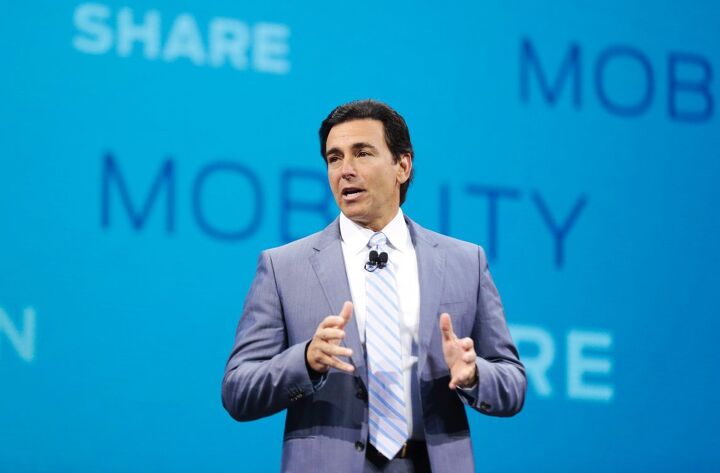Ford to Announce Firing of CEO Mark Fields This Morning: Report

Mark Fields has reportedly been fired from his position as CEO of Ford Motor Company, to be replaced by a man he appointed as head of the automaker’s mobility subsidiary.
According to Forbes, the company will announce the appointment of Jim Hackett as CEO this morning, part of a broader shakeup of the company’s upper ranks. Hackett, former CEO of Steelcase, served on the automaker’s board for three years before being named head of Ford Smart Mobility LLC in March, 2016.
Fields, a 28-year Ford veteran who replaced Alan Mulally in mid-2014, was reportedly booted by the company’s board amid a continued decline in share values. Two weeks ago, the CEO was grilled by board members and shareholders alike over the direction he has taken the company.
Sources told Forbes Executive Chairman Bill Ford and the rest of the board had lost confidence in Fields’ ability to run the company. Since taking the helm, Ford’s share prices have dropped by 40 percent. Compared to rival GM’s aggressive streamlining and healthier balance sheet, Ford recently saw its first-quarter profits sink 35 percent.
Many question whether Field’s aggressive push for Ford’s entry into the realm of mobility services has harmed the company’s financial footing.
The report suggests new roles are on the way for other executives within the company. Those individuals include James Farley, president of Ford’s Europe, Middle East and Africa division, and Joseph Hinrichs, head of Ford North America. Ray Day, group vice president of communications, will reportedly be replaced by Mark Trudy, vice president of communications for the company’s Asia-Pacific division.
Before being named CEO on July 1, 2014, Fields served as Ford’s chief operating officer. Ford has announced a news conference at its world headquarters in Dearborn at 9:45 this morning.
[Image: Ford Motor Company]

More by Steph Willems
Latest Car Reviews
Read moreLatest Product Reviews
Read moreRecent Comments
- V8fairy Not scared, but I would be reluctant to put my trust in it. The technology is just not quite there yet
- V8fairy Headlights that switch on/off with the ignition - similar to the requirement that Sweden has- lights must run any time the car is on.Definitely knobs and buttons, touchscreens should only be for navigation and phone mirroring and configuration of non essential items like stereo balance/ fade etc>Bagpipes for following too close.A following distance warning system - I'd be happy to see made mandatory. And bagpipes would be a good choice for this, so hard to put up with!ABS probably should be a mandatory requirementI personally would like to have blind spot monitoring, although should absolutely NOT be mandatory. Is there a blind spot monitoring kit that could be rerofitted to a 1980 Cadillac?
- IBx1 A manual transmission
- Bd2 All these inane posts (often referencing Hyundai, Kia) the past week are by "Anal" who has been using my handle, so just ignore them...
- 3-On-The-Tree I was disappointed that when I bought my 2002 Suzuki GSX1300R that the Europeans put a mandatory speed limiter on it from 197mph down to 186mph for the 2002 year U.S models.


































Comments
Join the conversation
Lots of Monday morning quarterbacking here. Ford is doing fine, but could be better. The F150 was a huge risk that worked out very well. Lincoln is dong well for the minimal investment involved - particularly versus the huge sums misspent at Cadillac. Ford's biggest problems are reliability and fuel efficiency. The vehicles have sub par reliability, and the efficiency on their turbo cars - especially the real world results - are terrible. Hard to justify great new investments in small cars, but if the focus and fiesta were reliable and fuel efficient they would,be respectable contenders in their classes. Ford also has moved to break even in Europe, while GM had to give up and abandon that market.
Well said, Deadweight! I commend you. Succinct too! I would add this: That is generally the way it has been for a while. During the eras from 1900 to 1930, and again 1945-1973, the interests of big money coincided with the interests of "middle" and "working" America. That is, the path to even bigger riches for big money was to invest and to PAY the masses well. Since 1973 in America, and 1990 in the West in general, this has ceased to be the case. This is why we (the 'average' American) is running--on a treadmill, and going backwards.